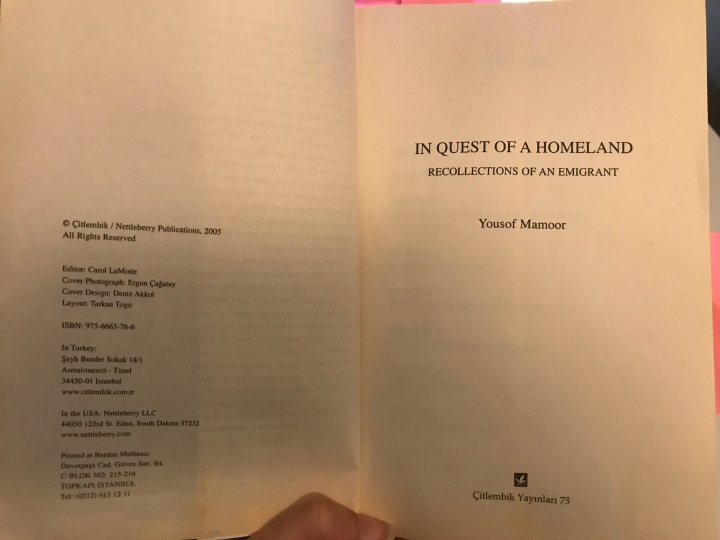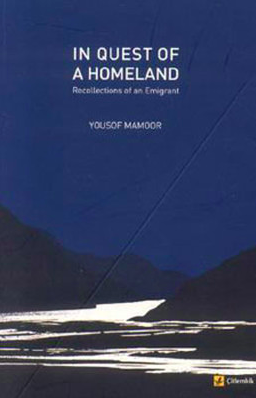
In Quest of a Homeland: Recollections of an Emigrant (2005) tells the story of Yousuf Mamoor, an Uzbek immigrant forced to leave his hometown, Kokand in eastern Uzbekistan, in 1930 at the age of fourteen.
History textbooks chronicle the events that had led to the immigration of the Mamoors and thousands of families from central Asia that, like the Mamoor family, had to flee their homes to survive. Following the Revolution of 1917 led by Lenin, Soviet power was officially established in Russia, creating unending instability and chaos in central Asia. A few years later, the Red Army’s victory in 1924 resulted in the formation of new republics within the U.S.S.R., including Uzbek Soviet Socialist Republic which increasingly suffered from Stalin’s political and economic reforms in the early 20s and 30s.
As Yousuf Mamoor tells the reader, around this time the Mamoors as a merchant family are constantly reminded by the Soviet authorities that Uzbekistan is no longer safe for kulaki, a derogatory term used to address capitalists. Their business is confiscated; they are harassed and arrested for having engaged in trade and for being Muslim, and eventually their house is seized by the regime. The Mamoor family thus is left with no other option than to escape, first to China (East Turkmenistan) and later to then-British India on foot and horseback.
As political unrest increases in the countries to which Yousuf Mamoor flees, he continues to undertake highly precarious journeys and transgresses borders across India, Afghanistan, Saudi Arabia, and much later the U.S. to find safety and stability.
Mamoor’s memoir thus not only presents the reader with historical facts that have shaped and reshaped the lives of millions of central Asians. The book also interweaves Mamoor’s personal experiences with the major historical events such as the WWII, the end of British rule in India, partition in India and the birth of Pakistan, the invasion of Afghanistan, and the collapse of the USSR. As Mamoor reflects on his childhood, he writes that “Being a young boy, I did not know nor could I comprehend the significance, importance, and moment [sic] of leaving the place where I was born, of paying respects and saying my last goodbye to my birthplace—that beautiful land, which in our classic literature was sometimes likened to Paradise” (89). He continues:
Only later in my life when I became an emigrant and a stranger in foreign countries, did I realize what it means to be a man without a country, and homeless.
pg. 89
In this context, writing the memoir takes on an important role for Mamoor, as the narrative space allows him to explore further all the hardship through which he suffered.
In the first few chapters, Mamoor offers insight into the history of Uzbekistan, as well as into Uzbek customs as he introduces himself, his family, and his hometown. The book serves as a metaphorical family heirloom, but Mamoor also establishes the western reader as his audience and his purpose as didactic. When he mentions his stepmother who lives with the rest of his family, for instance, he interjects the narrative to tell the reader:
Perhaps you would immediately ask me what I mean by my stepmother and my own mother, at the same time. The reason for this is that in our religion, Islam, polygamy is lawful, and my father had married a second time two years before I was born.
pg. 28
He then moves on to elaborate on the specific conditions that need to be met if a man wishes to marry a second time: “The practice of polygamy is unacceptable to the people in the West, but it’s permitted in Islam- subject to very strict conditions, conditions that make it very difficult to practice, especially in present day conditions (28). After he provides the reader with suras as evidence from the Quran, he clarifies his objective stance on the matter. “It’s not my intention to citizen other peoples’ social customs or propensities,” he writes, “nor do I want to praise or advocate polygamy, but I wanted simply to give some background explanation about our laws covering the subject” (29). In a similar vein, Mamoor’s detailed discussion on the history of Czar Russia and the various forms of Soviet repressions through which central Asians suffered is followed by his in-depth reflection on Uzbek pastimes such as askia, a contest of making jokes, characteristics of the residents of different Uzbek cities, and recipes for traditional Uzbek dishes.
This vacillation between his accounts of historical events and explanations of Uzbek Islamic customs runs throughout the book, representing Mamoor’s efforts to preserve his culture and identity in all the countries he is compelled to call home, and by extension, within his narrative for the next generations. In various chapters, for instance, he expounds on how his family celebrated “Eid-Qurban,” a religious festival, in Kashgar, his father’s pilgrimage to Mecca, his stay with an Imam from Tashkent in Bombay, and his marriage rituals. As he delves deeper into the historical events that emerge in and around the countries in which he takes refuge, he elucidates how his family prioritized the preservation of their religious and cultural values.

Without a doubt, the aforementioned characteristics of In Quest of a Homeland render it an excellent candidate for anyone interested in reading a book from and about Uzbekistan. But here’s what I’ve found particularly interesting about Mamoor’s memoir:
My research about this book and the author (sorry, Barthes!) didn’t yield any favorable results. I couldn’t find any information about Mamoor, and only few reviews/notes have been written about his 455-page book. This is perhaps not surprising as the memoir is a heavy read and one I would assign in a class. Mamoor also informs the reader from the beginning that “I am neither a writer nor a novelist nor an intellectual, but I am simply the narrator of the story of my life” (8). He then continues as follows:
I had no intention or desire to write a book or a memoir about my experiences. But after leaving my country and becoming an émigré myself—an unwelcome stranger almost everywhere, humiliated, maltreated and sometimes experiencing a host country’s open or disguised contempt for unwelcome foreigner, it becomes obvious that a man without a country is not a man at all.
pg. 9
The fact that Mamoor was a refugee who merely wished to narrate his family’s story who had been compelled to escape their home to survive and, by extension, the stories of “millions of people” who “have become suddenly aliens in their own lands, forced to flee […] the warm embrace of their homelands, leaving behind their relatives, their cultures and most important of all [sic]- to breathe the air of real freedom” (8) refutes the misconception that the value of a book lies in its success in the market, as well as in the popularity of its author.
The value of In Quest of a Homeland for me lies in its honesty and contribution to, in historian Juliet Gardiner’s terms (1988), history as an ongoing dialogue between the present and the past.
Although Mamoor began to write his manuscript in 1984 when the Soviet Union was still a superpower and an increasing number of refugees in the so-called global south fled abroad due to oppressive regimes, civil wars, ethnic cleansing in the 80s and 90s, this is an all-too familiar story for those of us who have been eyewitnesses to the ongoing Palestinian, Syrian, Mexican, and the Ukrainian refugee crises.
Mamoor discusses in detail, for instance, the ways in which Uzbek refugees in Kabul were consistently harassed, discriminated against, and dehumanized in the 20s and 30s when thousands of central Asians fled Soviet persecution. “The only good thing that Afghans did for those refugees,” he writes, “was not to turn them away back to their countries.” He elucidates:
But once in their midst, instead of welcoming them as Muslim brothers and sisters fleeing from an infidel’s tyranny and persecution, they treated them generally with harshness and brutality. Instead of allotting them some temporary place or refuge or letting them live in towns or villages of their choice, the local organized random mass deportation and forcible movement of thousands of Uzbeks and their families to a faraway, barren and almost uninhabitable town […] in the southwestern part of the country.
pgs. 330-31
As he explains further the consequences of Stalin’s purges and persecutions back in Uzbekistan, he highlights the world’s inconceivable indifference to the sufferings of innocent people:
The whole world was aware of what was going on in the Soviet Union and it was watching helplessly those appealing and gruesome conditions there. But regretfully no one, no country or any organization did anything to stop or prevent those atrocities and calamities. The policy of non-interference in other states’ internal affairs was an easy excuse for them and this they let millions of innocent and unfortunate people perish at the hands of a despot.
pgs. 250-52
Sadly, his words resonate with us all in the 21st century. At a time when there’s an increasing need for empathy and compassion in the world, books such as In Quest of a Homeland can help us to contextualize the refugee crises unfolding right before our eyes and to understand the plight of the displaced through a humanistic perspective.
As Mamoor writes:
I’m addressing this story to those fortunate people who live in their own homelands and take this priceless gift for granted; to those who do not know what it means to be homeless; to those who have not gone through the deprivations and countless problems those unfortunate displaced people endured and continue to endure.
pgs. 9-10
The least we can do is to continue reading the narratives that humanize the disenfranchised, to question and resist- in any way we can- the global systems that perpetuate the dehumanization of the displaced, and to understand the importance of intersectional solidarity. History is, indeed, an unending conversation between the past and the present, In Quest of a Homeland reminds us–and it is our responsibility as world citizens to be a part of it.
Have you read or heard of In Quest of a Homeland? Any recommendations for Uzbek literature?
P.S.: This post is part of my Reading around Asia, the World Bookshelf Project; I take this project slowly, and I sometimes publish posts on RUOT on some of the books I read as part of this project. At other times, I write a brief refection on the RUOT Instagram page; if you’re already subscribed to RUOT, you can also follow my reading journey here.


This sounds like a fascinating and informative read! I would like to learn more about Uzbek culture, thank you.
LikeLiked by 1 person
Thanks for the note, Rebecca!
LikeLiked by 1 person
Thanks a lot for this. I’m looking for literature by migrants from the former Soviet Block countries (myself being one, tho in a totally different epoch and circumstances) and it’s hard to find; this looks like a fascinating gem that I’ll try to get my hands on.
LikeLike
It is certainly an interesting one!
LikeLiked by 1 person